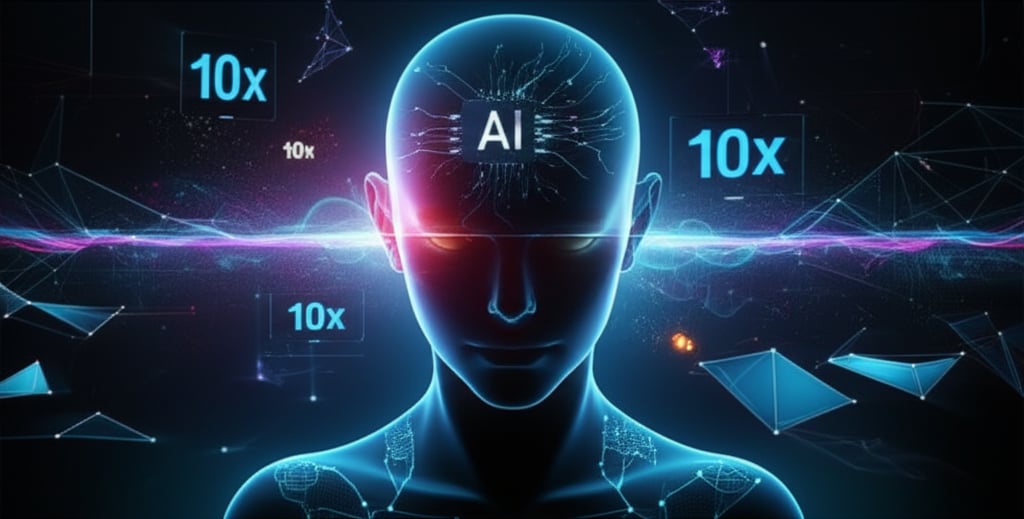Agency Architects: Engineer 10x Growth with Next-Gen AI Delivery

In the intensely competitive digital landscape of today, agencies are constantly striving to maximize client achievements and carve out a dominant market position. Conventional approaches to content marketing, often characterized by manual execution and significant resource demands, frequently struggle to generate the rapid, exponential growth that businesses crave. Indeed, a profound paradigm shift is sweeping across industries: a prominent management consulting firm reports that nearly 78% of enterprises now integrate marketing AI into at least one operational facet, a notable surge from just 55% two years prior. This deep integration of artificial intelligence isn't merely a marginal improvement; it signals a revolutionary epoch where AI-driven content deployment is rapidly becoming the indispensable blueprint for agencies aiming to catalyze tenfold client expansion.
The Shifting Tides of Agency Prosperity
Many agencies wrestle with the persistent challenge of demonstrating tangible outcomes, a frustration echoed in countless online forums where business proprietors lament pouring substantial capital into marketing efforts, only to observe negligible impact on reach, conversions, or audience engagement. This pervasive sentiment highlights a critical pain point: traditional methodologies, even when bolstered by generous budgets, often fail to move the needle on key performance indicators.
The ambition for colossal client expansion – a "10x" leap – necessitates a decisive break from outdated practices. The quintessential solution lies in harnessing advanced artificial intelligence to reconfigure content delivery, transforming it from a mere cost center into a potent engine of growth. This emergent paradigm liberates agencies from the constraints of manual workflows, ensuring that every piece of content actively contributes to overarching strategic business objectives.
Key Insight: The pursuit of exponential client growth unequivocally demands a strategic reorientation from conventional marketing tactics towards intelligent, AI-powered content solutions.
AI's Master Plan for Unprecedented Content Delivery

In an era where every millisecond profoundly impacts user experience and commercial outcomes, contemporary Content Delivery Networks (CDNs) are undergoing a monumental transformation, propelled by artificial intelligence and distributed edge computing. These groundbreaking advancements are fundamentally rewriting the conventions for how digital content is disseminated, drastically reducing latency and enabling hyper-responsive services across the globe.
Intelligent algorithms, meticulously powered by machine learning, now spearhead network routing decisions. Through the rigorous analysis of colossal datasets, historical patterns, and real-time network conditions, AI routing dynamically optimizes data pathways. This means content is not only routed with peak efficiency but also with predictive foresight, anticipating traffic surges and potential bottlenecks well before they can disrupt the end-user experience. Empirical data suggests that such AI deployments can slash latency by as much as 40%.
Complementing the power of AI routing is the ascendance of edge computing, which processes data geographically closer to the end-user. This physical proximity is paramount for applications demanding instantaneous responses, such such as live streaming, immersive gaming, and augmented reality experiences. Edge placement dramatically minimizes delays, alleviates strain on central servers, and ensures exceptional network resilience, even during periods of peak demand. This decentralized architectural design is a cornerstone for delivering an uninterrupted, high-performance digital journey.
Key Insight: AI-driven routing and edge computing form the bedrock of modern content delivery, radically enhancing speed, reliability, and responsiveness for global audiences.
Automating Authority: The Content Creation Renaissance

Content creation, once a labor-intensive undertaking, has been profoundly reimagined by AI, solidifying its position as one of AI's most mature and impactful applications within the marketing sphere. Over 85% of marketers currently integrate AI tools for content generation, consistently reporting a significant uptick in marketing effectiveness.
Platforms like the Jasper platform and Copy.ai insights have evolved far beyond mere text generation, transforming into comprehensive go-to-market ecosystems that automate entire sales and marketing workflows. Tools such as Canva design and Synthesia video are democratizing professional visual and video content creation, empowering businesses to produce top-tier multimedia assets at previously unimaginable speeds.
For agencies and enterprises fixated on market dominance, the challenge extends beyond simply creating content; it lies in producing high-quality, SEO excellence-optimized, and brand-consistent content at an immense scale. This is precisely where advanced platforms become absolutely indispensable. Envision a platform designed as an automated engine, a growth flywheel that meticulously manages the entire content lifecycle. Such a system can generate expert-level articles, ensuring every piece of content is perfectly calibrated for search engines—from strategic headings to relevant links and engaging images—propelling articles towards prime rankings.
This innovative approach, exemplified by solutions that integrate comprehensive content automation capabilities, eradicates the typical chaos of juggling multiple tools and cumbersome manual processes. It guarantees unwavering brand voice consistency, automatically embeds pertinent multimedia, and provides effortless distribution by directly scheduling and publishing to your blog. For ambitious founders and lean marketing teams, this represents an 'unfair advantage' – the capacity to achieve consistent organic traffic and dominate high-value keywords without ballooning overheads. The ultimate objective is to become a 'Builder, Not a Blogger,' leveraging proprietary AI models for unparalleled scalability and 100% original, plagiarism-free content.
Key Insight: AI transforms content creation from a systemic bottleneck into a scalable growth engine, enabling agencies to forge authority and drive traffic with unprecedented efficiency and superior quality.
Engineering Growth: Real-World Applications and Measurable Returns
The theoretical advantages of AI in content delivery translate into substantial real-world dividends for businesses prepared to embrace these innovations. Consider the journey of 'Apex Digital,' a burgeoning marketing agency that, despite a highly skilled team, struggled to consistently deliver high-volume, top-ranking content across its diverse client portfolio. Manual content creation proved to be an immense drain on resources, severely limiting their capacity to onboard new clients and effectively scale existing campaigns.
Inspired by the success stories of individual content creators who master smart distribution and niche focus, Apex Digital integrated next-generation AI content delivery solutions. They adopted an advanced content automation platform that not only generated initial drafts but also meticulously optimized for SEO, ensured unwavering brand voice consistency, and managed automated publishing. This strategic shift allowed their human strategists to channel their expertise into refinement, strategic oversight, and crafting client-specific narratives, rather than the laborious initial production phases.
The outcomes were transformative: Within six months, Apex Digital reported an average 40% surge in organic traffic for their clients' content portfolios, accompanied by a notable 25% increase in qualified lead generation. One particular client, a B2B SaaS firm, witnessed their content's search visibility skyrocket by 300% on crucial industry terms, mirroring the kind of exponential reach achieved by some content creators with surprisingly low-view but high-impact assets.
This triumph was not merely about automating tasks; it was about strategically augmenting human collaboration with AI's inherent speed and analytical prowess, empowering the agency to deliver superior, high-performing content that directly propelled their clients' revenue objectives. It underscores that the right fusion of AI and human ingenuity can unlock growth previously deemed unattainable, allowing agencies to amplify their impact without proportionally escalating their costs.
Key Insight: Strategic AI integration empowers agencies to achieve remarkable advancements in content performance and client acquisition, directly translating into substantial revenue growth.
Strategic Deployment: Navigating the Obstacles of AI Adoption
While the promise of AI-driven content delivery is undeniably vast, its effective and ethical AI implementation introduces specific challenges. Concerns surrounding AI bias, factual inaccuracies, intellectual property rights, and even the perception of content originality are legitimate. Agencies must skillfully navigate these considerations to cultivate and preserve client trust and brand credibility.
A structured approach to ethical AI governance and quality assurance for agencies:
- Formulate Explicit Ethical Directives: Establish clear internal policies addressing data privacy, algorithmic bias mitigation, and transparency in AI-assisted content creation. This includes ensuring strict compliance with regulations like GDPR.
- Implement Robust Human Oversight: Regard AI as a potent assistant, not an autonomous substitute. Human editors and strategists must meticulously review, refine, and provide final approval for all AI-generated content, guaranteeing alignment with brand voice, cultural nuances, and factual precision.
- Prioritize Originality and Value: Emphasize that AI's role is to augment, not diminish, the distinctiveness of content. Utilize tools and processes that ensure AI outputs are 100% original and contribute genuine value, transcending mere summarization.
- Invest in Ongoing Training: Equip your team with the requisite skills to effectively prompt, manage, and quality-assure AI tools. The future of marketing roles entails a hybrid skill set, where marketers fluidly co-create with AI.
- Monitor Performance and Iteratively Refine: Continuously analyze the performance of AI-generated content, user engagement metrics, and client feedback. Leverage these insights to refine AI prompts, processes, and overall strategy, ensuring perpetual improvement and agile adaptation.
Key Insight: Successful AI integration necessitates a structured approach to governance, quality assurance, and continuous human-AI collaboration to mitigate risks and maximize value.
The Architect's Toolkit: Indispensable AI Platforms for Agencies
For agency architects meticulously crafting next-generation growth blueprints, selecting the appropriate suite of AI tools is paramount. The market abounds with specialized platforms engineered to enhance various facets of content delivery and marketing operations:
- Content Creation & Generation: Tools like the Jasper platform and Copy.ai insights excel at generating diverse content forms, from blog outlines to persuasive ad copy. For visual content, platforms such as Canva design and Synthesia video facilitate the rapid creation of professional-grade images and videos, including AI-generated avatars for scalable multimedia production.
- Marketing Automation & Workflow Management: Platforms like ClickUp management streamline project planning, risk analysis, and resource allocation, significantly reducing manual effort. HubSpot, with its embedded AI integrations, delivers personalized automation across CRM and email marketing functionalities.
- Data Analytics & Decision Intelligence: Tools such as Tableau AI and Microsoft Power BI, leveraging natural language querying, democratize access to data and furnish predictive insights, enabling faster and more accurate decision-making. Salesforce Einstein offers predictive analytics specifically tailored for sales and marketing teams.
- Advertising Optimization: Platforms like Omneky advertising employ machine learning to generate and optimize ad creatives across various social media channels, while The Trade Desk utilizes AI for intelligent programmatic ad placements. Optmyzr automates PPC bidding for elevated campaign performance.
Key Insight: Agencies must strategically select and integrate AI tools across content creation, automation, analytics, and advertising to forge a robust, high-performance marketing stack.
Future-Proofing Your Agency: Strategic Outlook for 2025 and Beyond
The AI marketing landscape continues its breathtaking pace of evolution, presenting both strategic imperatives and unparalleled opportunities. The future unequivocally demands ceaseless adaptation to AI's advancements, with a sharp focus on specialized applications, autonomous agents, and the seamless synergy of AI with emergent technologies.
The acceleration towards domain-specific AI models is palpable, promising even greater cost efficiencies and targeting precision. By 2027, numerous AI models are expected to be highly specialized, favoring agencies possessing profound vertical expertise. Conversational AI will become more deeply embedded within customer journeys, while 'agentic AI' – autonomous AI agents – are poised to become sophisticated collaborators capable of managing entire marketing campaigns, from initial generation to continuous optimization. This seismic shift will redefine workflows and empower marketers to delegate full campaign cycles.
The widespread deployment of 5G connectivity will further amplify the capabilities of AI-driven content delivery. With its ultra-low latency and formidable high throughput, 5G technology will enable pioneering applications such as real-time augmented reality and intelligent autonomous systems in smart cities. A leading marketing technology authority recently remarked that 'the integration of AI and edge computing, particularly when supercharged by 5G, will transcend being a mere competitive advantage; it will become a foundational requirement for any agency aspiring for sustained market leadership. Those who champion agile adoption and ethical governance of these technologies will unequivocally define the next decade of client growth.'
Key Insight: The future necessitates continuous adaptation to AI's evolution, concentrating on specialized applications, autonomous agents, and the synergy of AI with emerging technologies like 5G.
Frequently Asked Questions (FAQ)
Q1: Can Artificial Intelligence Entirely Replace Human Content Creators in Agencies?
A1: Absolutely not. AI functions as a powerful augmentation. While it excels at efficiency, automation, and data processing, human creativity, emotional intelligence, strategic storytelling, and cultural nuance remain fundamentally irreplaceable. The most successful approach undeniably involves collaborative human-AI efforts.
Q2: How Do Agencies Uphold the Quality and Originality of AI-Generated Content?
A2: Quality and originality are rigorously maintained through meticulous human oversight. Agencies should judiciously utilize AI for initial drafts and optimization, followed by comprehensive human review, fact-checking, brand voice alignment, and refined polishing. Many advanced platforms are specifically engineered to produce 100% original content, but human vetting remains perpetually essential.
Q3: What Are the Foremost Advantages of Implementing AI in Content Delivery for Agencies?
A3: Key advantages encompass significantly accelerated content production speed, heightened personalization for precise target audiences, dramatically improved SEO performance, reduced operational expenditures, and the invaluable ability to scale marketing efforts without proportionate increases in headcount. Ultimately, this translates into accelerated client growth and a superior return on investment.
Q4: How Can Agencies Initiate the Integration of Next-Generation AI Content Delivery Solutions?
A4: Begin with a comprehensive audit of your current content performance and identifying critical pain points. Implement AI tools incrementally, commencing with pilot programs in specific areas like content ideation or initial draft generation. Prioritize ongoing human training, establish crystal-clear ethical guidelines, and consistently monitor performance for continuous, iterative refinement. Collaborating with specialized AI platforms can significantly expedite this transition.
Key Insight: AI stands as a strategic partner, rather than a replacement, for agencies unequivocally committed to innovation, uncompromising quality, and scalable client growth.
About the Author:
Sarah Chen is a distinguished SEO strategist and agency consultant boasting over 15 years of experience in steering digital marketing firms towards exponential growth. Her expertise lies profoundly in leveraging cutting-edge technological solutions and data-driven insights to empower agencies and their clients in achieving top-tier organic visibility and commanding significant market share.
One agency executive recently conveyed, "Implementing these novel AI approaches has utterly transformed our delivery. We are now witnessing lead growth and client satisfaction metrics that were once mere aspirations."